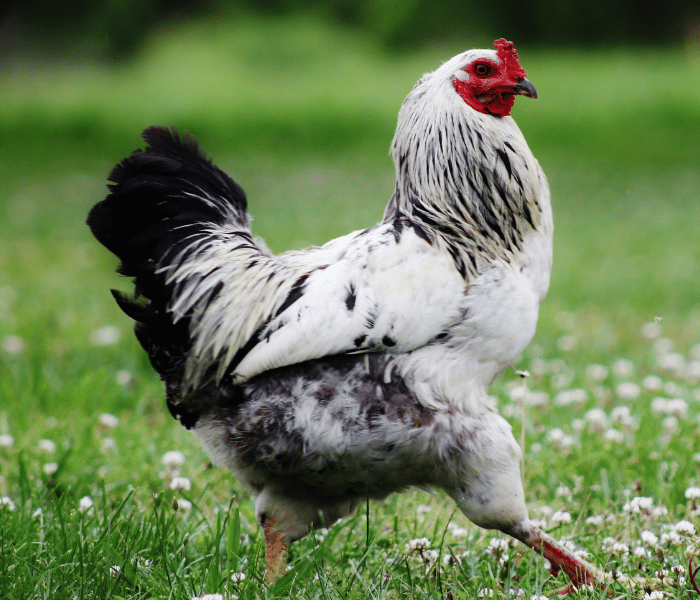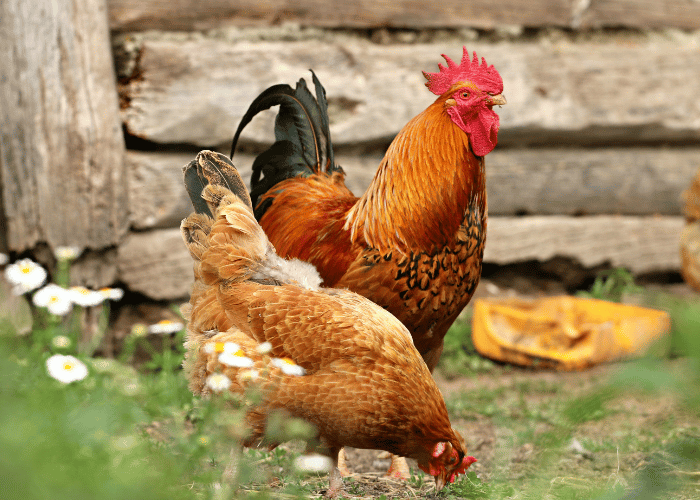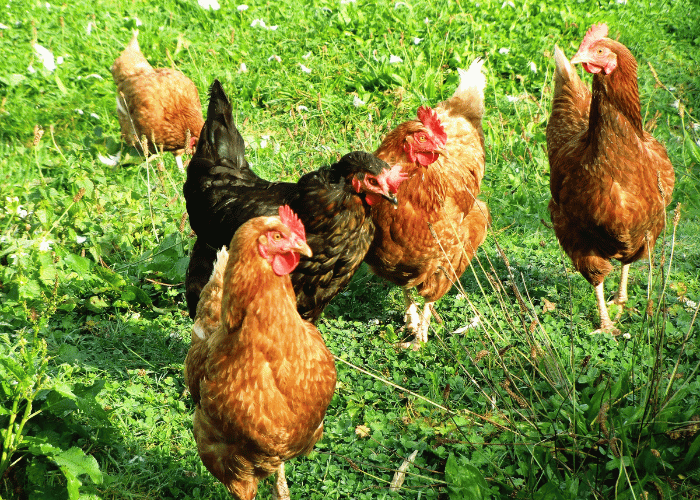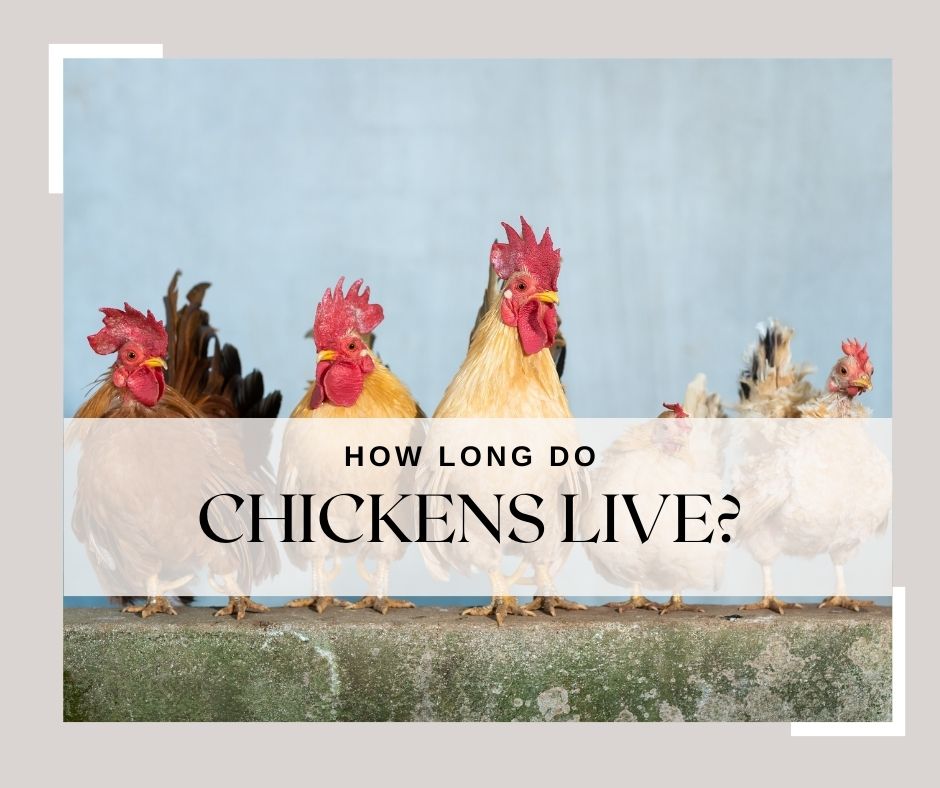How Long Do Chickens Live
Table of Contents
So you’re wondering how long chickens live, right? Well, you’ve come to the right place! Not surprisingly, the lifespan of chickens can depend on a lot of factors, similar to other animals. But, let’s dive straight into the juicy details!
With good care, many breeds of backyard chickens can live for around 5 to 10 years. Some can even reach 12 years if they’re really lucky! But don’t take my word for it – that’s a pretty big range, isn’t it? Giving it some context, think about it like you’re taking care of a pet dog. Different breeds have different lifespans, and all depends on the level of care they receive too.
Now, your industrially farmed varieties – those guy have it a little tougher. Their lifespan usually doesn’t exceed 5 to 7 years due to the harsh conditions they’re often raised in and are frequently culled after only 1 or 2 years once they stop producing eggs as efficiently. In summation, how long your chicken will live depends on the breed, their environment, and the quality of care they receive.

Understanding Chicken Lifespan: The Basics
You might be asking, “How long do chickens live, anyway?” It’s a common question, especially for those new to raising these feathered friends. Well, buckle up, because we’re about to explore the answer in detail!
In general, chickens can live anywhere from 5 to 10 years, depending on several factors. Those factors include their breed, general health, and how well they’re taken care of. Some hardy breeds, like the Rhode Island Red or the Sussex, have been known to reach ripe old ages, while others might not have as long a lifespan.
Below is a quick snapshot of the average lifespans of a few popular chicken breeds:
| Breed | Average Lifespan |
|---|---|
| Rhode Island Red | 6-8 years |
| Leghorn | 4-7 years |
| Sussex | 5-8 years |
You’ll notice that different breeds have varying lifespans. But, no matter the breed, there’s one golden rule when it comes to raising chickens: care is key. Your chickens are wholly dependent on you for their needs, and how you manage those needs greatly impacts their longevity.
Now, let’s cover the basics:
- Healthcare: Regular vet check-ups, vaccinations, and quick reaction to any illnesses, can significantly boost your chicken’s life expectancy.
- Diet: Feeding them a balanced diet is crucial too. Chickens have specific nutritional needs, so make sure you’re providing nourishing feed and clean water.
- Living conditions: Chickens need a safe and comfortable environment, free from predators and extreme weather.
Remember, these are just the basics. There’s a plethora of knowledge out there on each of these points.
So, there you have it! Understanding a chicken’s lifespan isn’t just about numbers, it’s about appreciating the role that care, diet, and environment play in their lives. Ready to dive deeper? Let’s move to the next topic! Who knows, you might become a chicken-whisperer sooner than you think!

Factors Influencing Your Chicken’s Longevity
So, how long do chickens live, you might wonder. Why, the answer isn’t that simple! You see, a chicken’s lifespan depends on multiple factors.
The breed of your chicken might well be the most influential. For instance, heritage breeds generally live longer than commercial breeds, say about 5-7 years for heritage and about 2-3 years for commercial breeds. Here’s a little table showcasing this data:
| Breed Type | Average Lifespan |
|---|---|
| Heritage | 5-7 years |
| Commercial | 2-3 years |
Now, feeding your chickens a nutritious diet is another crucial factor. By ensuring your feathered friends consume a rich, varied diet, you’ll be promoting their health and potentially extending their lifespan.
Your chicken’s living conditions also play a significant role. Chickens living in cramped, unclean environments are more likely to fall ill than those in a clean, spacious coop. So, be sure to keep your coop tip-top!
Vaccinations and healthcare are super important too. Diseases can significantly cut short a chicken’s life, but regular check-ups and appropriate vaccinations can help protect them.
Think about this as well: predators such as foxes or hawks may pose a danger. Secure fencing and proper chicken houses can help keep those rascals at bay.
If you’ve ever thought of letting your chickens roam free, ponder this: free-range chickens are known to live longer, happier lives. So maybe it’s time to open that coop door and let them free!
Remember, it’s not just about having chickens to lay eggs for you. It’s about ensuring they’re healthy, happy, and taken care of.
- Note: all the above factors impact your chicken’s lifespan:
- Breed
- Diet
- Living conditions
- Healthcare
- Protection from predators
- Freedom to roam
Your chicken’s lifespan may be a complex issue, but it’s not out of your hands. You’ve got plenty of ways to ensure your chickens live their best life!
Common Breeds and Their Life Expectancies
So, you’ve been curious about how long chickens live, huh? Well, there’s no one-size-fits-all answer to that. Life expectancy can vary greatly depending on the breed. Interested in specifics? Let’s break it down for you!
Among the most common breeds is the Rhode Island Red. Notoriously hardy, these chickens are often fit as a fiddle for about 8 to 10 years. That’s impressive for a chicken, don’t you think?
Let’s flip the coin and look at the Leghorns. Did you know they’re among the main sources of white eggs around the world? They have been known to live for approximately 4 to 7 years. It seems their short-lived existence doesn’t prevent them from being quite productive!
How about the Orpingtons, another favorite in backyards everywhere? Regularly pampered and well-cared for, they can stick around for 8 to 12 years. That’s a good amount of time to develop a real bond with your feathery friends.
Moving to another popular breed, the Plymouth Rocks. Their lifespan? It tends to hover around 6 to 10 years. Always a joy to have around, their appeal goes beyond just their lifespan.
It might be helpful to see the life expectancies side by side. So, below is a nifty little table to give you a comparative idea:
| Breed | Life Expectancy |
|---|---|
| Rhode Island Red | 8 – 10 years |
| Leghorns | 4 – 7 years |
| Orpingtons | 8 – 12 years |
| Plymouth Rocks | 6 – 10 years |
Remember! These are estimates. Factors like diet, care and living conditions play a big role in how long your chickens will live too. Yet, it’s clear that breed matters a lot in a chicken’s life expectancy.
Who knew there was such variety in life spans among chickens, right? Well, now you do!
Keeping Your Chickens Healthy: Tips and Tricks
Well, guess what? We’re halfway through, and kudos to you for hanging on! Now, let’s dive right into something equally important ─ how to keep your chickens healthy. Your chickens’ lifespan can vary greatly, and much of it depends on how well you care for them.
First off, your chickens need plenty of room. Space is paramount for chickens to live, eat, and sleep comfortably. Without enough room, they can become stressed and unhealthy. A good rule of thumb is to allow 3 to 4 square feet per chicken inside the coop and around 10 square feet outside in a run.
Next up─ Nutrition. Give your flock a well-balanced diet. It’s crucial for their health. They primarily need a mix of grains, protein (like mealworms), and access to fresh veggies and fruits. Additionally, chickens should always have access to plenty of clean, fresh water.
Table 1: Essential Nutrition for Chickens
| Grains | Proteins | Fresh Fruits & Vegetables |
|---|---|---|
| Corn | Mealworms | Pumpkins |
| Barley | Earthworms | Cabbage |
| Oats | Seeds | Cucumbers |
Also, good news─ chickens can even eat leftovers from your kitchen (except foods like onions, avocados, and chocolate among others which are harmful to them)!
Try not to spoil the fun─ ensure they get regular exercise. Allow your chickens to roam freely if possible. Exercise helps prevent obesity and increases egg production.
Now, who doesn’t love a good spa day? Well, your chickens aren’t any different! Regular dusting baths help them keep parasite-free. You can create a dusting area by simply filling a shallow box or garden spot with sand and some diatomaceous earth.
Remember, prevention is better than cure. Keep an eye out for any ill signs, such as changes in their behavior, egg production, or appearance. Early detection of any issues is key to maintaining a healthy flock.
So there you have it, folks! Some simple yet effective tips and tricks to keep your chickens hale and hearty. Remember, a healthy chicken is a happy chicken. Now, isn’t that just CLUCKING great?

Addressing Common Chicken Health Issues
Next up, let’s tackle some common health issues that might affect the life of your feathered friends. Poultry keeping isn’t all sunshine and eggs, but with proper care and attention, you can mitigate most problems.
Parasites are one of the top culprits when it comes to chicken health issues. These pests, particularly mites and lice, can cause severe discomfort and, in worst case scenarios, even death through blood loss. Regular cleaning of your hen-house and keeping an eye for signs of infestation (like feather pecking or changes in laying habits) can go a long way here.
Next on the list is the ubiquitous worm. Chickens can easily pick up various types of worm from their environment and these can cause a host of issues. Regular worming is a must, usually every 3-4 months. Make sure you’re using a recommended product and don’t forget to respect the egg withdrawal period!
| Common Parasites | Signs Of Infestation | Necessary Action |
|---|---|---|
| Mites and Lice | Feather Pecking, Changes in Laying | Regular Cleaning, Veterinary Treatment If Required |
| Worms | Weight Loss, Diarrhea, Reduced Egg Production | Regular Worming Every 3-4 Months |
If you’re really unlucky, you may have to deal with avian diseases, such as Avian Influenza (Bird Flu) or Marek’s Disease. These require professional intervention and, in some cases, may necessitate the culling of your flock to prevent further spread.
Let’s not forget nutritional deficiencies. Chickens need a balanced diet to thrive. Too much or too little of a specific nutrient can wreak havoc with a chicken’s health. It’s good practice to provide a commercial feed designed for laying hens, and supplement with scraps and bugs when appropriate!
To sum it up:
- Regularly clean your coop.
- Look for signs of parasites and address them quickly.
- Provide a balanced diet.
The majority of these issues are preventable with good hygiene and husbandry practices. Up next? The exciting nesting habits of chickens!
Wrapping Up: The Long and Short of Chickens’ Life
So, you’ve learned quite a bit about chickens’ lifespan! On average, a backyard chicken will stick around for 5-10 years, give or take. Of course, this can vary significantly depending on breed, diet, healthcare and environment.
Let’s create a snapshot. Here’s a handy markdown table to illustrate:
| Average Lifespan | |
|---|---|
| Backyard | 5-10 Years |
| Industrial (Layer) | 1-2 Years |
| Heritage Breed | 8-15 Years |
In an industrial setting, layer chickens usually only live for about 1-2 years. And on the higher end, strong heritage breeds can reach ages of 8-15 years. It’s evident that a chicken’s life is not just a simple number – it’s quite a stretch!
Now question is, how can you support your feathered friends to possibly see them chirping around for a decade or more?
- Adequate healthcare: Regular vet check-ups can nip health issues in the bud.
- Proper diet: Feed ’em with the appropriate nutrients to strengthen their immunity.
- Safe environment: Protect them from predators and harsh weather conditions.
- Breeds matter: If you are expecting a longer companionship, opting for hardier breeds like heritage ones could be a smart pick.
It’s important to remember that every chicken is a unique individual with its own journey. As an attentive chicken parent, you’ll get to see them experiencing life’s ups and downs, just like us. Enjoy this incredible journey of coexistence. After all, these cluckers are more than just egg-layers, aren’t they?






